- Home
- JoAnn Ross
On Lavender Lane Page 3
On Lavender Lane Read online
Page 3
“You, the jarhead, and steaks sounds great. But just because you’re crazy in love doesn’t mean that—”
He was about to tell her he’d really prefer she not invite the cupcake baker when the boat reached the burial site.
Before he’d arrived at the dock, the cremains had already been transferred to a woven wicker basket lined with biodegradable paper, then covered with flower petals.
His father had stated his wishes to be buried at sea. So although Duncan Chaffee had never been specific about the details, since he’d served in the Navy during Vietnam and had continued to volunteer in various troop-support groups, Lucas had decided to include some trappings of a military funeral.
Sax came forward to present him with a folded flag. Considering that his former teammate felt like the brother he’d never had, Lucas knew the profound sympathy he saw in Sax’s eyes was genuine.
In contrast to the standing-room-only memorial service his father’s partners had insisted on in Portland, the one that had Duncan’s friends, peers, and clients flying in from all around the world, Lucas had purposefully kept this private service intimate.
On board along with Scout, who’d saved his team’s lives while losing one of her legs to an IED, were Charity; Sax; and Sax’s fiancée, Kara, who was Shelter Bay’s sheriff—which was ironic, considering that Sax had at one time been the town bad boy. Charity’s mother, Amanda Tiernan-Jacobs-Chaffee-Gillette-Rodzianko-Templeton, who may have divorced her third husband but had stayed a close friend, had flown down from Seattle.
Also in attendance was Sofia De Luca, who’d taken his father and him under her wing that first lonely summer Duncan and Lucas had arrived in Shelter Bay, after Lucas’ sister’s death and his parents’ divorce.
Not only had she made sure they’d eaten, but she’d also offered compassion and a female friendship both man and boy had desperately needed. It was, unsurprisingly, Sofia who’d offered to cook this evening’s funeral supper at her lavender farm.
Lucas also had a more personal connection to Sofia, since she just happened to be the grandmother of the girl he’d let get away.
He accepted the flag, handed it off to Charity, then took a deep breath before giving the eulogy he’d been awake all night writing.
“Thank you all for coming today. And a huge thanks to Cole, for providing the boat that’s letting me fulfill my father’s wishes.”
Hell. It was even harder than he’d thought it would be. He cleared his throat to rid it of the word-blocking lump. Then put his hand on Scout’s head, who, seeming to sense the tangle of his emotions, licked it with her huge tongue.
“My father had a profound impact on the life I live today. And the person I’ve become. When you spend a lot of time in war zones with other guys, you get to talking about family, and I’ve come to realize that the relationship between a father and son can often be complicated.
“Well, it was never that way with my father and me. Although our family had its challenges, I was fortunate to have a simple, powerful, loving relationship with Dad.
“Two days ago, I attended a memorial service for him in Portland. There wasn’t an empty seat in the cathedral, which said something about both his ability to make friends and the respect so many held for him.
“It’s typical at funerals and memorial services to remember only the good things. But I think it says something about my father that there was no bad. He was, hands down, the kindest, most optimistic person I’ve ever met.
“Duncan Chaffee loved people. In recent days, obituaries in newspapers all over the world have praised his artistic vision, the soaring beauty of the buildings he designed, his pro bono charity work. But you don’t measure a man by his work and awards. You measure it by the lives he touched. The lessons he taught.
“To me, he’ll always be the protector who chased monsters from beneath the bed when night fears kept me awake; the sportsman who taught me how to bait a fishhook and tack a sailboat; the booster who encouraged me to ask a girl, whose teenage beauty left me stutteringly tongue-tied, to dinner at the Crab Shack; and, most of all, the man who taught me to embrace whatever life threw my way.”
Advice Lucas had held on to during his years as a SEAL medic in places most Americans couldn’t name and none would ever want to visit.
“I’ve tried, over the past days, to make sense of my father’s death. And the only thing I can figure out is that heaven must need an architect.”
Navy SEALS were known for the rigid self-discipline drilled into them in training. But that didn’t prevent Lucas’ voice from cracking. As Amanda began to weep, he struggled for control, and, knowing his father would expect it of him, won.
“So”—he took another breath, gaining strength from the silent support he felt from those who’d always meant the most to him—“God, since I know he’d never ask for anything for himself, and I’m assuming you’ve already granted what would have been his sole request—to be reunited with my sister we lost years too soon—I’m asking that you provide him with his favorite simple pleasures.
“Please give him a worktable with a view of the outdoors. Although his favorite views were the Pacific Coast and the Cascade Mountains, he loved every inch of this magnificent planet you created, so changing vistas would be great.
“Please give him a sailboat so he can feel the salt breeze in his hair as he skims across the water, a TV so he can watch his beloved Oregon State Beaver football games, and a cold beer at the end of the workday.
“And please, God, give him all the love, laughter, and happiness he brought to so many others during his time on earth.”
Although his heart was broken, Lucas managed to exchange a smile with Charity.
“That was lovely,” she said, her eyes shimmering with tears.
“It was hard.” Really, really hard.
“I know.” She squeezed his fingers. “He’d started coming back here more the past year as he eased into retirement, and being with him was like that wonderful summer we spent together before he and Mom split up. He was probably, in many ways, more of a father figure than my own.”
“He always thought of you as a daughter. I think losing you was the hardest thing about your mom’s and his divorce.…Ready?”
“I suppose so.” She didn’t sound any happier about the reason for this reunion than Lucas was. Together, hands entwined, they lowered the small, woven basket into the ocean Duncan had taught them both to love.
As it sank, flowers floated gently to the surface.
While Cole circled the boat twice around the floating flowers, allowing the others to toss their own blossoms into the water in a final good-bye, Sax, the musician of the group, played taps. The melancholy yet peaceful tones of the song lingered in Lucas’ heart even after they’d ceased to vibrate in the sea air.
As the boat chugged through the waves back toward Shelter Bay, Sofia came over to Lucas.
“That was a very moving service,” the older woman said. “I know your father’s so proud of you.”
“Thanks.”
“That was Maddy, wasn’t it? The girl you were afraid to ask out.”
“Yeah.” He managed a slight smile at the terrified twenty-year-old he’d once been. Then, because he was solely responsible for it having ended so badly, he said, “I’m sorry.”
It was the truth.
“Oh, that’s all water under the bridge.” She waved his words away. “You were both young. Life moves on.”
Madeline certainly had moved on. Just as he’d intended. And although heating up a military MRE was the height of his culinary skills, since arriving Stateside, Lucas had taken to watching her cooking shows. She was, impossibly, more beautiful than ever. And, he continually reminded himself, married.
“So,” Sofia said, and then asked him the question he’d heard innumerable times in the last week. “What are your plans?”
“I’m not sure,” he responded the same way he had innumerable times.
“I have a suggesti
on about that. And a favor to ask.”
Although her smile was warm, Lucas could tell, from a life that had often depended upon his ability to read people’s expressions, that Sofia De Luca was holding back a secret.
His curiosity piqued, as he suspected she’d intended, he merely arched a brow. And waited.
“I don’t want to intrude on your thoughts right now,” she said, avoiding answering his unspoken question. “We can talk after the supper.”
“She’s up to something,” Lucas mused as he and Charity watched the older woman walk over to talk with Sax and Kara.
“Absolutely,” Charity agreed. She went up on her toes and brushed a kiss against his cheek. “And if whatever it is will keep you in Shelter Bay longer, I’m all for it.”
3
Somehow, although she couldn’t quite get the image of her husband with another woman out of her mind, Madeline made it through the rest of the demonstration. And although she could tell that her audience was equally distracted, the short ribs proved to be a huge success. Afterward, not only did people line up to have her autograph her book, but there were more than a few sales of the pans she’d used to cook the ribs, which made the store manager, who’d come to watch the demonstration, happy.
Blessedly, not a single person mentioned the video she suspected they’d all seen by the time she plated the dish.
Although the original plan had been for her to stay in Omaha overnight, Madeline wanted to get back home. Especially after the operator at the Las Vegas hotel told her that Maxime had already checked out. This was not a conversation to be held over a cell phone. Madeline needed a face-to-face confrontation.
It was too soon to even begin to think about what she was going to do. Ever since viewing the video, her thoughts had been whirling like fresh basil leaves in a Cuisinart. She needed a clear head.
And a sharp fillet knife, a voice in some cold, angry corner of her mind suggested.
Not that she’d ever resort to violence. But for a fleeting moment, as Birdy, who was chauffering her back to the airport, pulled up to the departure curb, Madeline found the fantasy more than a little appealing.
“You take care now,” Birdy said as she hugged Madeline good-bye. “And if that French husband of yours doesn’t do the appropriate amount of groveling, you can tell him you know a very big cop who owns a gun. And knows how to use it.”
Although she hadn’t thought she’d ever find anything the least bit humorous about the situation Maxime had put her in, Madeline smiled, just a bit, at that. Again, the older woman reminded her of her grandmother Sofia, who’d managed to lighten her heart after her parents had died.
And who’d also held her and dried her tears during the second-most-painful period in her life, after that lying, cheating Lucas Chaffee had broken her heart.
As furious as she was at her husband, his betrayal caused memories of that fateful night with Lucas to flood into her mind in vivid, humiliating detail.
What was wrong with her? Did she simply have miserable taste in men? Or did she send out secret signals, like the ultrahigh pitch of dog whistles, that only men incapable of being faithful could hear?
The flight, which was just over two hours, seemed to take forever as her still-stunned mind struggled to make sense of a situation that had her feeling as if she’d suddenly fallen down a rabbit hole and ended up drinking Earl Grey with the Mad Hatter.
At least when she was in the air, she was unreachable by phone or e-mail.
Although she was tempted to take advantage of the free wine being poured in the first-class cabin, to numb her brain, Madeline wanted a clear head when she confronted Maxime, so she forced herself to stick to one Bloody Mary with her chilled black olive spaghetti salad. And managed not to pour the entire mini bottle of vodka into the mix.
When the plane finally landed at La Guardia, she was not surprised to find her phone’s voice mail filled with messages.
The first three were from Pepper McBain, her agent, assuring her that this unsavory publicity storm would blow over and it wouldn’t hurt her relationship with either her new sponsor or the Cooking Network.
“After all,” the brisk, savvy woman who represented some of the biggest food stars in the business said, “you’re the injured party, darling. Everyone, from the network bigwigs to your audience, adores you. And, lucky us, not only are your shows on hiatus, but your contract’s up for renewal.”
“Lucky,” Madeline murmured as she wheeled her carry-on up the jetway to the terminal. Apparently, Pepper had joined her down the rabbit hole and was now the one pouring the tea.
There were, unsurprisingly, more calls from the producer of her television shows. “Don’t you worry about a thing, girlfriend,” Janine Miller said, her staccato tone sounding even more New York rapid-fire than usual. “That video will probably send ratings skyrocketing. After all, other celebrities have rocketed to fame after a sex tape hit the Internet.”
Although she knew Janine was trying to be supportive, such comparisons did nothing to boost Madeline’s spirits.
Finally, she got down to a call from her grandmother, which was the most depressing of all, because if a seventy-something woman could hear about Maxime’s video in a small, coastal town not known for being tuned in to celebrity gossip, it truly must have gone viral.
“Darling,” Sofia said, “I’m so sorry about what happened and just wanted to remind you that if you do feel the need to get away, the farm will always be your home. I’m also starting a very exciting new venture I think you might just be interested in. Not that you don’t already have a great deal on your plate these days. But call me when you get an opportunity. Meanwhile, take care. I love you.”
For the first time since her life had come crumbling around her feet in that department store, Madeline’s eyes stung with tears. After taking her in, Sofia had become more like a mother than a grandmother. Not only had she provided unconditional love, she’d also picked up her culinary training where her parents had left off and encouraged her lifelong dream of following in her parents’ footsteps.
With her grandmother’s blessing, after graduating from high school, Madeline spent the next years traveling throughout Europe, learning the ropes in restaurants that were often owned by chefs who’d been friends of her parents.
In her mid-twenties, she’d returned to the States, where she studied at the Culinary Institute of America. It was while working between semesters as a stagiaire—unpaid intern—at Chez Maxime, Maxime Durand’s Manhattan restaurant on Columbus Circle, that she’d fallen in love.
It definitely wasn’t love at first sight. In the beginning, she hadn’t even been certain she’d last the summer. Within the first week working the line, she discovered that all the stories about Maxime Durand’s infamous temper were not exaggerated. Making her wonder why he’d bothered to take her on in the first place, he didn’t even try to hide the fact that he looked down his aristocratic Gallic nose at the country-style Italian and Greek food Madeline had grown up eating. Food she loved to cook: simple, but delicious meals revolving around sustainable, local food.
Their affair began predictably enough, with him giving her private tutorials after the restaurant had closed. While their cooking styles couldn’t have been more disparate, there was no denying his genius, and she’d eagerly soaked up his vast knowledge of classic cuisine, like a rich tiramisu drenched in espresso and Marsala wine.
Although she’d grown used to being called Maddy during her years in Oregon, he’d insisted the name was too frivolous for a serious chef. Since the way he’d pronounced her name—Mad-eh-Leen—in his sexy French accent had practically made her melt like meringue topping a lemon pie in July, she willingly returned to her more formal birth name.
Two weeks after he’d first invited her to stay after hours at the restaurant, they had their first date in the kitchen of his Riverside Drive apartment, where they worked together on a meal of Coquilles St. Jacques, steak au poivre, garlic roasted potatoes, and cho
colate crepes with fresh raspberries and Grand Marnier crème Chantilly.
Floating on air as she was, with a Jacques Brel CD crooning love songs in the background, the lit-up George Washington Bridge out the window could have just as easily been the Eiffel Tower.
They’d stayed up all night, drinking champagne, talking about how wonderful it would be to cook together all the time. To create a shared life around food. By the time the sun was rising over the river, Madeline had begun fantasizing about being married to this larger-than-life culinary genius.
Later, she realized she’d been naive not to pay more attention to the fact that every dish he’d made that night had been French. And whenever she’d tried to inject a bit of her own tastes into a meal, he’d brushed off her suggestions as “mere peasant food.”
Now, three years after that memorable night, she decided that during the early days of their affair, she’d made a major mistake not to heed his continued insistence that having already failed at two marriages, he’d come to the conclusion that he didn’t possess the “marriage gene.”
Apparently, he doesn’t possess the monogamy gene, either.
She was waiting on the sidewalk outside the terminal in the taxi line when a well-dressed woman strode up to her on an expensive pair of stiletto boots. “You’re Madeline Durand.”
Madeline hadn’t become entirely accustomed to being approached by strangers. She didn’t think she ever would. But usually such encounters were positive, with viewers telling her how much they enjoyed her programs or book, or how, like Birdy, they’d started cooking because the recipes she created seemed so accessible.
That’s what she was expecting now.
She was wrong.
Because, although she wouldn’t have thought it possible, Madeline’s already horrible day was about to get worse.

 Magnolia Moon
Magnolia Moon Summer on Mirror Lake
Summer on Mirror Lake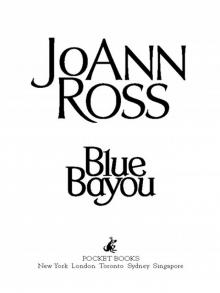 Blue Bayou
Blue Bayou Champagne and Moonlight
Champagne and Moonlight No Regrets
No Regrets Long Road Home
Long Road Home Southern Comforts
Southern Comforts Herons Landing
Herons Landing Untamed
Untamed No Regrets (Mira Romance)
No Regrets (Mira Romance)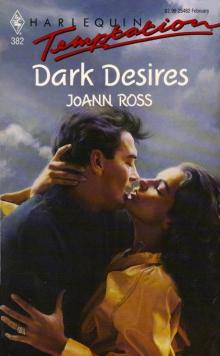 Dark Desires
Dark Desires Wanted!
Wanted! River Road
River Road Midnight Runaway
Midnight Runaway The Long Way Back
The Long Way Back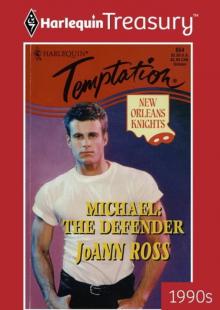 Michael: The Defender
Michael: The Defender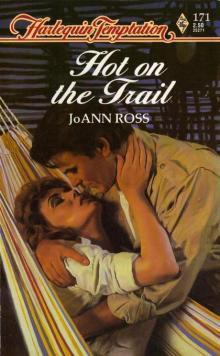 Hot on the Trail
Hot on the Trail When I'm With You
When I'm With You Legends Lake
Legends Lake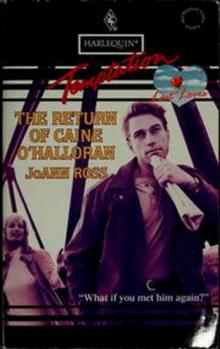 The Return of Caine O'Halloran
The Return of Caine O'Halloran Dance with a Dynasty
Dance with a Dynasty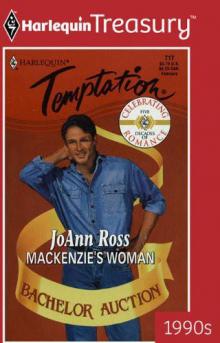 MacKenzie's Woman
MacKenzie's Woman Impulse
Impulse Sunset Point: A Shelter Bay Novel
Sunset Point: A Shelter Bay Novel You Again: A Shelter Bay novella (Shelter Bay series Book 8)
You Again: A Shelter Bay novella (Shelter Bay series Book 8)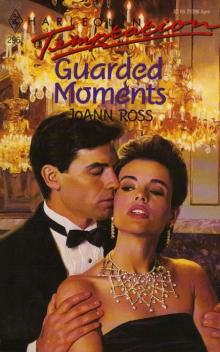 Guarded Moments
Guarded Moments No Safe Place
No Safe Place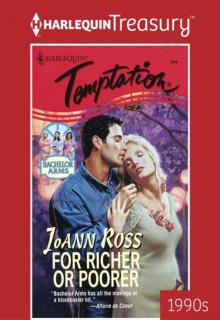 For Richer or Poorer
For Richer or Poorer Private Passions
Private Passions Once Upon a Wedding
Once Upon a Wedding Snowfall on Lighthouse Lane
Snowfall on Lighthouse Lane Christmas on Main Street
Christmas on Main Street A Place in Time (Rum Runner Island Book 1)
A Place in Time (Rum Runner Island Book 1) Leaving Blue Bayou
Leaving Blue Bayou The Return of Caine O'Halloran: Hard Choices
The Return of Caine O'Halloran: Hard Choices Lucky in Love
Lucky in Love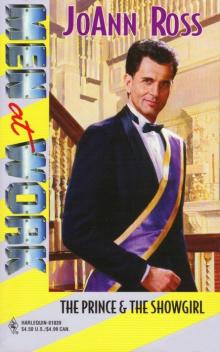 The Prince & The Showgirl
The Prince & The Showgirl Castaway Cove
Castaway Cove A Woman's Heart
A Woman's Heart One Summer
One Summer Ambushed
Ambushed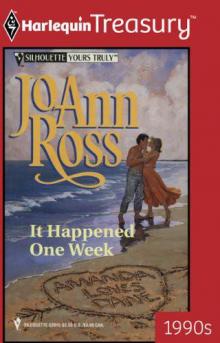 It Happened One Week
It Happened One Week Home by the Sea
Home by the Sea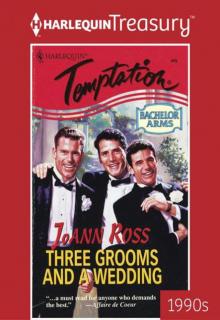 Three Grooms and a Wedding
Three Grooms and a Wedding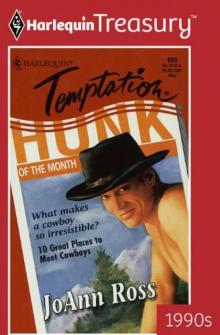 Hunk of the Month
Hunk of the Month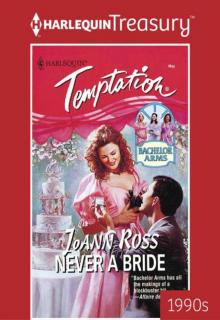 Never a Bride
Never a Bride Sun Kissed
Sun Kissed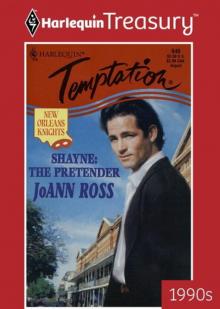 Shayne: The Pretender
Shayne: The Pretender Legacy of Lies
Legacy of Lies Far Harbor
Far Harbor Finn
Finn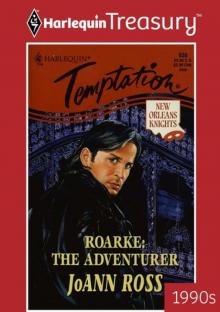 Roarke: The Adventurer
Roarke: The Adventurer I Do, I Do...For Now (Harlequin Love and Laugher)
I Do, I Do...For Now (Harlequin Love and Laugher) Briarwood Cottage
Briarwood Cottage On Lavender Lane
On Lavender Lane Sea Glass Winter
Sea Glass Winter River's Bend
River's Bend Christmas in Shelter Bay
Christmas in Shelter Bay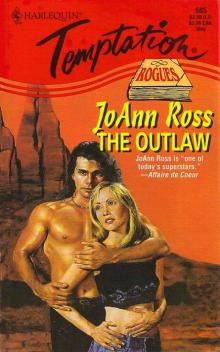 The Outlaw
The Outlaw Castaway Cove (2013)
Castaway Cove (2013) Confessions
Confessions Moonshell Beach: A Shelter Bay Novel
Moonshell Beach: A Shelter Bay Novel